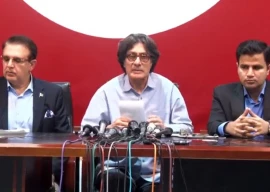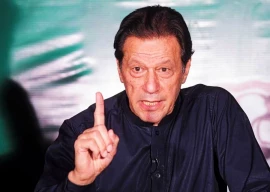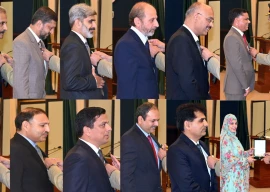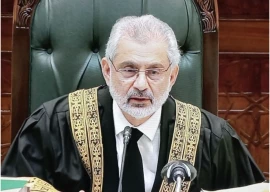
Pakistan and India agreed on Tuesday that terror was a threat to the two countries and cleared the way for inquiry commissions from each country to visit the other in connection with the 2008 Mumbai attacks.
During the course of the two-day talks in Delhi, Pakistani authorities provided detailed updates on the ongoing trial and investigation of the Mumbai terror attacks in their country.
“In principle, Pakistan has conveyed its readiness to entertain a commission from India on the Mumbai terror attack investigations,” the interior secretaries of Pakistan and India said in a joint statement after their meeting. “The modalities and composition in this connection will be worked out through diplomatic channels.”
The Indian home affairs ministry had earlier sent a request to Pakistani authorities asking for permission to send a commission to Islamabad and question the alleged conspirators of the 26/11 strike on Mumbai.
Islamabad had apparently not responded before to Delhi’s request to quiz seven people who are suspected to be involved in the attack.
Pakistan, too, will send a judicial commission to India in connection with the trial of the Mumbai attacks and the Indian authorities will provide dates for the visit within four to six weeks. Interior Secretary Qamar Zaman Chaudhry has invited his Indian counterpart GK Pillai for the next round of talks in Pakistan. Pillai has accepted the invitation.
In response to Pakistan’s gesture of allowing an inquiry commission, the Indian authorities also provided information about the Samjhauta Express blast probe. New Delhi has also assured that after the filing of the report in court, updated information would be shared with the authorities in Pakistan.
“The meeting was extremely positive. It has moved forward in reducing the trust deficit significantly,” Pillai told reporters after the meeting.
The two countries have also agreed that both sides would remain engaged on outstanding issues and the home secretary- and interior secretary-level dialogue would be organised bi-annually. The top bureaucrats of the two countries have also decided to set up a hotline between them to share real time information on terrorist threats.
“Both sides agreed to set up a hotline between the home secretary of India and the interior secretary of Pakistan to facilitate real-time information sharing with respect to terrorist threats,” the two men said in the joint statement.
The two sides also agreed to free fishermen kept in Indian and Pakistani jails. Coast guard often detain fishermen who stray into the waters of the other country.
Sources close to the union government confirmed that Pakistani authorities were hopeful that the high court could allow Islamabad to share with Indian investigators voice samples of terrorists who were allegedly involved in the Mumbai attacks. A lower court in Pakistan had rejected the case initially.
Strategic analyst Brahma Chellaney labelled the new hotline as a “public relations” stunt. “A line already exists between director-general of military operations of the two countries and this new line does not change the dynamics of India, Pakistan relations,” he said.
Meanwhile, Pakistan’s Twitter-savvy Interior Minister Rehman Malik has thanked Indian home minister ‘brother’ P Chidambaram for the successful talks between the home secretaries of the two countries.
“The meeting between the home secretaries of Pak and India has gone very well. Congratulation to both the teams… It is their first meeting after my meeting with H.E Mr. Chidambaram. Congratulation to brother Chidambaram,” Malik posted a message on the social networking website Twitter.
With additional input from wires
Published in The Express Tribune, March 30th, 2011.












































COMMENTS (1)
Comments are moderated and generally will be posted if they are on-topic and not abusive.
For more information, please see our Comments FAQ